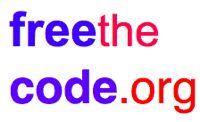 Welcome to the Free the Code site. Free the Code is an initiative whose concept started with Open Source for America. And it’s a simple as this: We’d like government and the citizens, businesses and educational institutions it serves to get a bigger return on their technology investment and maybe even contribute to the innovation economy.
Welcome to the Free the Code site. Free the Code is an initiative whose concept started with Open Source for America. And it’s a simple as this: We’d like government and the citizens, businesses and educational institutions it serves to get a bigger return on their technology investment and maybe even contribute to the innovation economy.
Okay that’s pretty broad, so let’s put a finer point on the idea. We think if the government pays for software – that’s either through its employes or paying contractors to develop new software – we think that should be made available for reuse and sharing. Could benefit other government agencies. Start-ups that could innovate upon. Non-Profits. Universities. And others we won’t think of now, but someone else will. But we do think releasing publicly-funded, custom software as open source is an idea whose time has come.
Our bright idea is not entirely new, In fact, some federal agencies are already doing this, but it hasn’t had much public discussion. That’s what FTC is about today; start the discussion, get people from different domains involved (beyond techies), refine the idea, and see what we can get done together.
We’re just getting started. But we hope you’ll stay tuned and participate as we begin a national conversation on the future of software in government.
In recent years, a number of US Federal Agencies have mulled over the idea of requiring software created as grant-funded research to be released under an unrestricted license, often as open source. Most notably, the National Science Foundation (NSF) has taken this tack since a 2011 Task Force made this recommendation, specifically recommending that
NSF should recommend open source distribution of software developed through its programs, while also recommending that grantees be aware of different open source license options and requirements at the grantee’s home institution.
Why the shift? With open source becoming increasingly mainstream, and its collaborative nature more fully understood, it likely comes down to a prefect triad of interests: Agency good stewardship of public funds; agency frustration with seeing government-funded software code often go unused; and visible public frustration with not fully benefiting from their tax investment in research and development.
While this makes a great deal of sense, a challenge remains with the grant recipient’s institution, where an institutional history of capitalizing on the value of intellectual property may still be the order of the day and open source may be less understood by a university’s legal team.
Here then are a few resources we’ve found for revisiting the research institution’s policy – from rationale to resource, sample policies and practical primers. Have some to share? Let us know.
- “Why Isn’t There More Open Source in Research?“ Josef Weinbub, Institute for Microelectronics, Technische Universität Wien
- “The Need for Open Source Software in Machine Learning” from the Journal for Machine Learning Research (download journal paper)
- “An Open Source Platform for Personal Robots ” Willow Garage (cogent argument contained for releasing research under an unrestrictive license)
- “Open Source Primer for Software Creators” Stanford University’s guidance
- “A Quick Guide to Open Source Software for the Scientist-Programmer“ Morin A, Urban J, Sliz P (2012) courtesy Public Library of Science
- “Why the Public Domain Isn’t a License” by Lawrence Rosen – Making the case that relying on public domain is not good enough for sharing software
Contact: press@opensourceforamerica.org
Open Source for America Asks Administration to “Free the Code”
Working group will develop best practices for taxpayer-funded software.
Portland, Ore. – OSCON – July 19, 2012 – Open Source for America (OSFA), an organization of technology industry leaders, non-government associations, and academic and research institutions promoting the use of open source technologies in the U.S. Federal Government, today launched a petition to “Free the Code,” in an effort to encourage the government to release custom-developed, taxpayer-funded software as open source by default.
“Free the Code is an initiative to start a national conversation on taxpayer investments in software and information technology,” said John Scott, president of Selection Pressure, LLC and co-chair of Open Source for America’s steering committee. “Specifically, we’re interested in how publicly-funded software code developed by the government, which isn’t already covered by a proprietary license, should be made available to the wider public.” Scott and Deb Bryant, open source in government adoption expert and recently elected to the Open Source Initiative (OSI) board, co-chaired a “Free the Code” session at the Open Source Conference (OSCON) this week in Portland, Oregon to invite interested parties to join the debate.
“Releasing code as open source would significantly increase reuse and collaborative development between federal agencies and the private sector,” said Bryant. “We hope that others agree and will sign our petition at We the People asking the Federal Government to share government-developed software under an open source license whenever possible.” Free the Code is asking anyone with an interest in taxpayer-funded software to sign the petition at:https://petitions.whitehouse.gov/petition/maximize-public-benefit-federal-technology-sharing-government-developed-software-under-open-source/6n5ZBBwf . The White House has pledged to respond to any petition on the We the People site that garners 25,000 signatures within 30 days. Free the Code has launched a website to share and discuss government policies and best practices on open source software. Anyone who wishes to join the working group and develop model policies can sign up at https://groups.google.com/forum/#!forum/freethecode.
About Open Source for America Open Source for America (OSFA) is an organization of technology industry leaders, non-government associations and academic and research institutions dedicated to advocating the use of open source software in the U.S. Federal government. Participation in Open Source for America is open to any individual or entity signing the campaign’s mission pledge at: www.opensourceforamerica.org. ###
 Today we’ve started the process of petitioning the White House to consider making federal software open source by default.
Today we’ve started the process of petitioning the White House to consider making federal software open source by default.
You can read about the We the People project to make the petition process accessible right on the White House web site, and sign our petition. You can read a fuller version of Why FTC here on our site.
How does it work? We have thirty days to gather 25,000 signatures. Once that threshold is reached, the administration will review our petition and provide a response.
If you happen to be attending OSCON in Portland, Oregon this week, then come hear us talk about Free the Code on Thursday at 2:30pm.
 We’re headed to Portland Oregon to kick off the national conversation at the annual O’Reilly Open Source Convention (OSCON). You can read the full abstract here on the FtC site or visit the conference page to get the big picture on this major open source community mostly-but-not-all event.
We’re headed to Portland Oregon to kick off the national conversation at the annual O’Reilly Open Source Convention (OSCON). You can read the full abstract here on the FtC site or visit the conference page to get the big picture on this major open source community mostly-but-not-all event.
Now that’s what we’re talking about.
On April 6th, 2012 the US Consumer Financial Protection Bureau (CFBP) rolled out their brand new Source Code Policy, setting the direction for their agency to consume and contribute to open source software.
We use open-source software, and we do so because it helps us fulfill our mission.
When we build our own software or contract with a third party to build it for us, we will share the code with the public at no charge.
As a brand new agency, CFBP is in the enviable position of creating their technology road map on a while sheet of paper. No legacy systems, no legacy contracts, no legacy skill sets; not your frequent scenario in the federal government. Unburdened by existing IT operations and entrenched processes based on outdated policies they were free to envision an approach that reflects and supports their public trust mission.
They may have had the new guy advantage, but they’ve done some great work that makes it easier for other agencies to model after. CFPB has crafted a clear, concise policy for its use. They follow in the footsteps of the Department of Defense, who began producing and refining policy for their agency personnel in this area a number of years ago. CFPB hopes other agencies will find the policy useful as a reference model (so do we!) and to that end have also shared it on GitHub Gist.
You can read the full story and access a copy of the policy on the agency web site.

Recent Comments